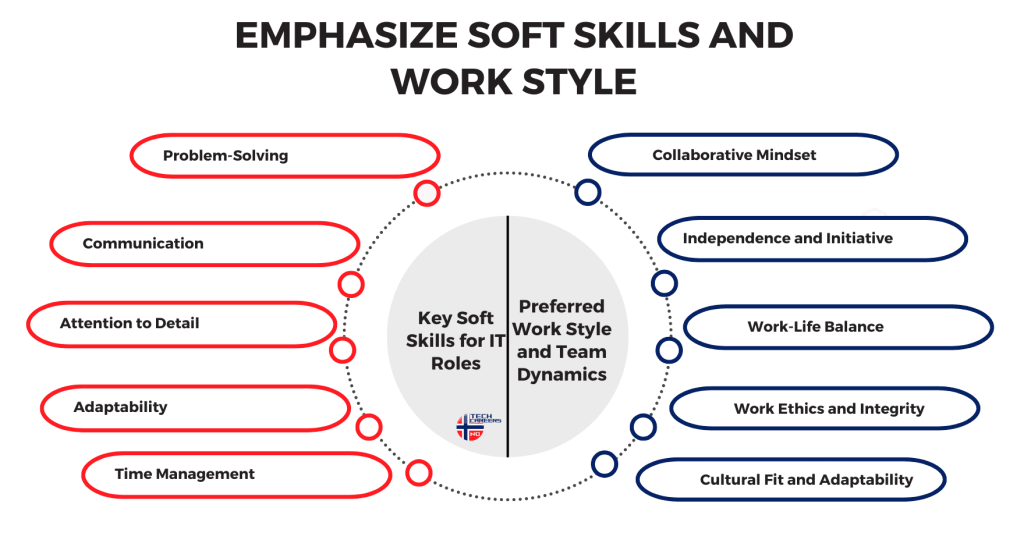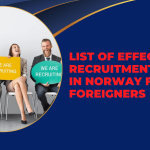
When crafting an IT programmer job description for Norwegian companies, it’s essential to define the role with precision. Clarity in job descriptions not only attracts the right talent but also sets expectations for potential candidates. A well-defined role helps candidates understand exactly what is required, minimizing mismatches and ensuring a smoother hiring process.
Highlight Whether the Role Focuses on Backend, Frontend, Full Stack, or Specific Technologies
One of the first things to specify in your IT programmer job description is the focus of the role—whether it’s backend, frontend, full stack, or involves particular technologies. Norway’s job market for IT is diverse, with demand for programmers specializing in various tech stacks. Here’s how to communicate these specifics:
- Backend Programmers: If the role is primarily backend, outline that the position will focus on server-side logic, databases, and APIs. Mention specific backend technologies such as Node.js, Python, Java, or .NET, and highlight responsibilities like building scalable server applications, managing databases, or integrating third-party services. This clear distinction will appeal to candidates who are experts in backend systems and enjoy working on the architecture that powers the application behind the scenes.
- Frontend Programmers: For roles focusing on frontend development, emphasize skills in creating engaging user interfaces and ensuring the best user experience. Mention technologies like HTML, CSS, JavaScript, React, or Angular, and detail tasks such as responsive design, browser compatibility, and user interaction enhancements. Frontend roles are suited for candidates passionate about visual elements and usability, so clearly stating this will attract the right fit.
- Full Stack Programmers: If your company needs a versatile programmer who can handle both frontend and backend, describe the role as full stack. Highlight the need for proficiency in both frontend and backend technologies and the ability to work on all parts of the software development process. Mentioning frameworks like MERN (MongoDB, Express, React, Node.js) or LAMP (Linux, Apache, MySQL, PHP) will help set expectations for candidates about the skills required.
- Specialized Technologies: Sometimes, an IT programmer’s job description must focus on niche technologies relevant to specific projects or industry needs in Norway jobs IT. Whether it’s a focus on AI, machine learning, DevOps, or specific cloud platforms like AWS, Azure, or Google Cloud, clearly outline these requirements. This attracts candidates with specialized skills who are seeking roles that match their expertise.
Providing this level of detail in the job description helps candidates immediately identify if they are a good match, increasing the likelihood of attracting qualified and interested applicants. This specificity also reflects the company’s understanding of its needs, showcasing a professional approach that resonates well within the Norwegian IT job market.
Specify Technical Skills and Competencies
A key component of any effective IT job description—whether it’s for an IT support analyst, programmer analyst, or technical support analyst—is a clear outline of the technical skills and competencies required for the role. This section of the job description serves as a critical filter, helping to ensure that candidates possess the necessary expertise to meet the demands of the position.
Essential Programming Languages and Tools
For roles like a programmer analyst job description, listing essential programming languages is crucial. Depending on the role’s focus, the job description should specify the primary languages and tools required. For instance:
- Backend-Focused Roles: Emphasize languages such as Java, Python, C#, Ruby, or Go, and highlight tools like SQL for database management and RESTful API design.
- Frontend-Focused Roles: Highlight skills in JavaScript, along with frameworks like React, Angular, or Vue.js, and essential frontend tools such as CSS preprocessors (Sass, LESS) and version control (Git).
- Full Stack Roles: A combination of backend and frontend skills is required, so clearly list languages and technologies spanning the full stack (e.g., Node.js, Express, MongoDB, and React).
Specialized Roles: For IT support analyst job descriptions or technical support analyst job descriptions, technical skills should include proficiency in diagnostic tools, knowledge of networking protocols, and familiarity with systems like Linux, Windows, or MacOS.
Software Development Methodologies and Best Practices
Beyond programming languages, the job description should specify familiarity with development methodologies and practices commonly used in the industry. Highlight experience with:
- Agile and Scrum: Specify if your company employs Agile methodologies and whether the candidate needs experience in iterative development cycles.
- DevOps Tools: For roles intersecting with deployment or infrastructure management, include knowledge of CI/CD pipelines, containerization (Docker, Kubernetes), and cloud platforms (AWS, Azure).
Testing and Debugging: Specify expectations for writing unit tests, automated testing, or debugging tools, which are critical skills for maintaining code quality and system reliability.
Experience Levels and Technical Certifications
When detailing skills for a programmer analyst or technical support analyst job description, it’s also essential to specify the required experience level. Be clear about whether the role is suited for junior, mid-level, or senior professionals, and whether specific certifications (e.g., AWS Certified Solutions Architect, Microsoft Certified: Azure Developer Associate) are needed.
- Junior Roles: Highlight foundational skills, willingness to learn, and some hands-on experience in the relevant tech stack.
- Mid-Level Roles: Specify a solid track record of hands-on programming, software development, or technical support experience, along with the ability to manage moderate to complex tasks independently.
Senior Roles: Emphasize extensive experience, leadership capabilities, and expertise in specific technologies, along with certifications that validate the candidate’s advanced skill set.

Highlight Educational and Professional Requirements
When crafting a job description IT role for a Norwegian company, specifying educational and professional requirements is crucial. This section sets the baseline for the qualifications needed, helping to attract candidates who meet the expected standards. For foreigners navigating the Norwegian job market, understanding these requirements can also be essential when working with recruitment agencies in Norway for foreigners, as it gives a clear idea of what companies are seeking.
Educational Requirements
Clearly outlining educational requirements in the job description helps ensure that applicants have the foundational knowledge necessary for the role. While practical experience often weighs heavily, formal education still plays a significant role in hiring decisions.
- Degree Requirements: Most IT roles, including programmer analyst and IT support analyst positions, typically require a bachelor’s degree in Computer Science, Information Technology, Software Engineering, or a related field. For more advanced positions, such as senior developers or technical leads, a master’s degree may be preferred or even required.
- Relevant Certifications: Certifications can often substitute or complement formal education, especially for specialized roles. Highlighting certifications like AWS Certified Developer, Cisco’s CCNA, CompTIA Security+, or Microsoft Certified Azure Developer is vital in a job description IT role. These certifications demonstrate up-to-date skills and proficiency in specific technologies, making candidates more attractive to employers.
- Continuing Education: For Norwegian companies, emphasizing the importance of ongoing education and skills development aligns well with the country’s commitment to professional growth. Mention if the company supports continuous learning through workshops, training, or access to online learning platforms, as this can be a significant draw for top talent.
Professional Experience Requirements
Detailing the level and type of professional experience required helps filter candidates effectively, ensuring that only those who meet the standards apply. This is particularly important for foreigners exploring opportunities through recruitment agencies in Norway for foreigners, as it sets clear expectations.
- Relevant Work Experience: For junior roles, 1-2 years of experience in a similar position is usually expected, focusing on hands-on skills rather than leadership. Mid-level roles typically require 3-5 years of experience, demonstrating a deeper understanding of the job’s technical aspects. Senior roles often demand 5+ years of professional experience, with a proven track record of managing complex projects, mentoring junior staff, or leading development teams.
- Industry-Specific Experience: For certain IT roles, having experience in specific industries such as finance, healthcare, or energy can be a significant advantage. This industry-specific knowledge enables candidates to understand unique challenges and regulatory requirements, making them more effective in their roles. Highlighting such preferences in the job description can attract candidates with the most relevant backgrounds.
- Internships and Projects: Especially for entry-level positions, mentioning the value of relevant internships, academic projects, or freelance work can be beneficial. For those new to the job market or shifting fields, these experiences can demonstrate practical skills that are directly applicable to the job.
Language Skills
For IT roles in Norway, while English is widely used, having proficiency in Norwegian can be a considerable advantage. Clearly state if Norwegian language skills are required, preferred, or not necessary, especially for roles involving client interactions or work in smaller towns. Recruitment agencies in Norway for foreigners often highlight this as a key factor for integration and professional success.
Emphasizing Professional Growth Opportunities
Lastly, Norwegian companies are known for their commitment to professional development. Including information about opportunities for career advancement, mentorship programs, or professional certifications the company supports can make your job description stand out. This not only attracts high-quality candidates but also shows that your company values long-term employee growth and engagement.
By detailing educational and professional requirements, you provide candidates with a clear understanding of what is needed to succeed in the role. This clarity helps recruitment agencies in Norway for foreigners match the right talent to your company, ensuring a smoother and more efficient hiring process.
Emphasize Soft Skills and Work Style
Emphasizing soft skills and work style in an IT job description is crucial, particularly in Norway, where teamwork, communication, and a balanced work environment are highly valued. Highlighting these traits helps attract candidates who fit well into the company culture.
Key Soft Skills for IT Roles
- Problem-Solving: Highlight strong analytical skills and the ability to troubleshoot complex issues.
- Communication: Emphasize clear verbal and written communication, essential for translating technical information.
- Attention to Detail: Stress the importance of precision, especially in roles like programmer analyst or support analyst.
- Adaptability: The tech landscape evolves quickly; candidates should be flexible and eager to learn new technologies.
- Time Management: Effective prioritization and organizational skills are crucial in managing multiple projects and deadlines.
Preferred Work Style and Team Dynamics
- Collaborative Mindset: Norwegian companies value teamwork and openness to feedback. Highlight the importance of working well with others.
- Independence and Initiative: Emphasize self-motivation and the ability to work autonomously, particularly in remote or hybrid setups.
- Work-Life Balance: Showcase your company’s respect for personal time, aligning with Norwegian values of balance and well-being.
- Work Ethics and Integrity: Highlight honesty and accountability as key traits in your workplace culture.
Cultural Fit and Adaptability: For foreigners, adapting to local work norms is essential. Highlight the importance of cultural alignment.

Outline Company Values and Culture
An effective job description, especially for high-level roles like IT Director, should highlight company values and culture. Including these elements in a job description IT Director helps attract candidates who align with your organization’s ethos, ensuring a good cultural fit.
Highlight Key Company Values
- Innovation and Learning: Emphasize your commitment to innovation and continuous learning. This attracts candidates who are forward-thinking and eager to drive technological advancement.
- Sustainability and Social Responsibility: Showcase your company’s dedication to sustainability and ethical practices, appealing to those who value working for socially responsible employers.
- Work-Life Balance and Well-being: Norwegian work culture values work-life balance. Highlight flexible work arrangements and employee support, particularly appealing for senior roles like IT Director.
- Collaboration and Open Communication: Describe your company’s culture of teamwork, flat structures, and open communication, signaling a collaborative leadership environment.
- Diversity, Equity, and Inclusion: Emphasize your commitment to DEI initiatives, demonstrating that your company values a diverse and inclusive workplace.
Describe Your Company’s Culture
- Dynamic and Fast-Paced: Mention if your environment is agile and fast-paced, attracting those who thrive in busy, challenging settings.
- Supportive Atmosphere: Highlight the supportive aspects of your culture, such as mentorship and mental health support, which are crucial for leadership roles.
- Transparency and Trust: Communicate your values of transparency and trust, showing that open communication and integrity are core to your company.
Outlining company values and culture helps potential candidates see if they’ll fit in, making your job description more appealing and effective in attracting the right talent.
How to Write a Job Description: Sample Template
- Job Title and Summary
Clearly state the job title and provide a brief overview of the role and its main objectives.
Sample:
Job Title: IT Support Analyst
Summary: Responsible for providing technical support, troubleshooting software and hardware issues, and ensuring smooth IT operations.
- Key Responsibilities
List the primary tasks and duties associated with the role.
Sample:
- Respond to IT support requests via phone, email, and chat.
- Troubleshoot and resolve software, hardware, and network issues.
- Maintain and update IT documentation.
- Required Skills and Qualifications
Detail the necessary technical skills, soft skills, and educational background.
Sample:
- Bachelor’s degree in IT or related field.
- Strong problem-solving and communication skills.
- Experience with Windows, Linux, and networking protocols.
- Work Environment and Benefits
Describe the work setting, hours, and any key benefits or perks.
Sample:
- Office-based role with remote work options.
- Competitive salary, health benefits, and opportunities for professional growth.
- Application Process
Provide instructions on how to apply and what to include (resume, cover letter).
Sample:
To apply, please submit your resume and cover letter through our careers page by [date].
Use this structure to create clear, concise, and appealing job descriptions that attract the right candidates.
Discover the Power of a Well-Crafted Job Description to Attract Top IT Talent
Clearly define roles, highlight key skills, and emphasize your company’s culture to connect with candidates who not only meet the technical requirements but also align with your values.


 Previous Post
Previous Post Next Post
Next Post